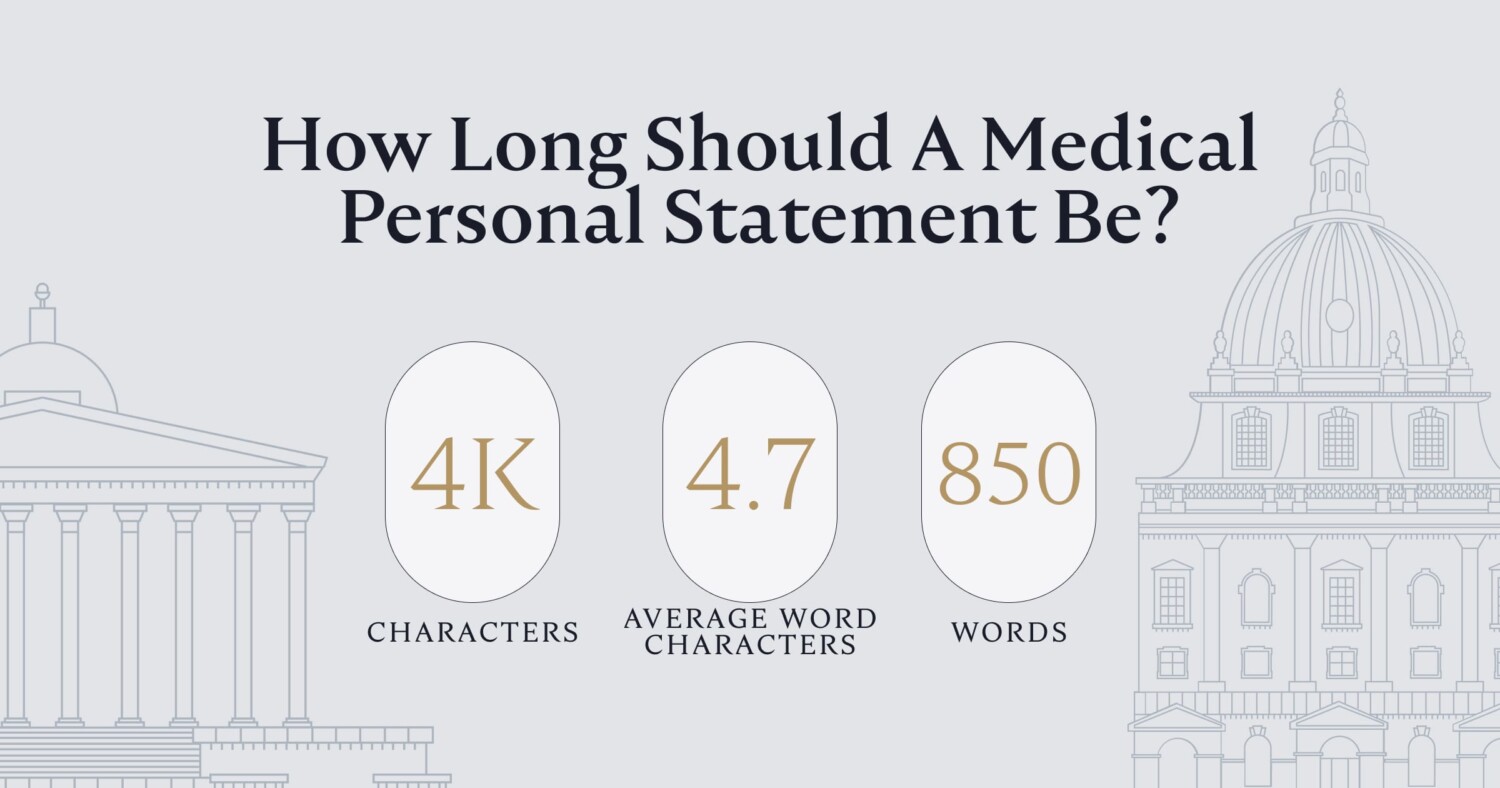Are you considering a career in medicine but feeling overwhelmed by the thought of writing your medical personal statement? You’re not alone. In the UK, medicine is one of the most competitive fields to enter, with on average, over 20,000 applicants for around 6,000 places each year.
But there’s hope, have you considered attending medicine summer schools? These programs can give you a great insight into what it’s like to study medicine at a UK university and network with your competition in your personal statement.
In this post, we’ll give you tips and tricks to make the process of writing your medical personal statement a breeze. So, whether you’re just starting or looking to revise, keep reading and take the first step towards a successful medical school application.
Brainstorm Your “WHY”
Why do you want to become a doctor? How do you know this is the career for you?
How will it benefit you and the people around you? These are just some of the questions that can help you connect with your “WHY.”
If there’s one thing to remember on writing a medical personal statement, they should reflect not just who you are but also what motivates you. There are two techniques you can learn to help you with the brainstorming process.
Journaling
The first technique is journaling. Just start writing about your passion for medicine without overthinking what people will say when they read it after. Write in complete freedom and just let it flow.
After a day or two of journaling, go back and review what you wrote. How do the words make you feel? How does it connect with your goals as a future doctor? Circle those parts that strike an emotional chord within you and use them as material for writing a medical personal statement.
We’ve also covered the exact method of how to write a personal statement – don’t miss out!
Read Books
The second technique is to read books about motivation and inspiration. Inspiring stories surround us. By reading some of them, you’ll have a basic idea of expressing why you want to study medicine.
Books may even help you remember pivotal experiences in your life that inspired you to pursue a career in the medical field.
In both techniques, the goal is to help you discover what motivates and inspires you to use it as material on how to write a medical personal statement. The more you are connected with your “why,” the easier it will be to write a personal statement that will touch the hearts of the admissions committee.
State Your Skills For Medical School
What makes you qualified? How will your skills help you become a successful doctor in the future? These are the questions that can help you validate your reasons for pursuing this career path.
After coming up with your “why,” it’s now time to think about what sets you apart from other applicants, and highlight your skills to prove that you are qualified to become a medical student. If you don’t know where to start, here are skills that are valuable to the medical field:
- A genuine desire to study medicine
- Self-awareness of one’s strengths and weaknesses
- Intellectual ability
- Communication skills
- Problem-solving skills
- Personal Organisation
- Capable of working under pressure
- Knows how to deal with uncertainty
- Responsible for one’s own actions
- Conscientiousness
- Conscious of one’s own health
- Confidence and efficiency in communication
- Team player
- Honest
- Respectful
- Resilient
- Empathetic
Which of these is your strongest suit? Pinpoint at least one to three skills you have that will help you succeed as a doctor. Focus on these strengths when you’re thinking about how to write a medical personal statement.
Related Read: How To Include Work Experience In Your Personal Statement?
Back-Up Your Skills With Credentials
Of course, it’s not enough to state your skills. Back them up with credentials and the admissions tutors will remember you —state awards, accomplishments, or experiences showcasing your strengths when writing your personal statement. Check out this list for inspiration:
- Extracurricular activities (clubs/organisations)
- Awards or certifications
- Employment
- Internship
- Volunteering
- Leadership positions
- Hobbies
- Meaningful life experiences
- If you shadowed a doctor
Tell A Story
You may have all the necessary qualifications to be accepted as a medical student, but what counts is how you stand out from others.
Remember, the admissions committee reads thousands of medical personal statements every year. So it would be best if you found a way how to make yours memorable. The best way medical school applicants can give a lasting impression is to present the piece as a story. Can you imagine reading a personal statement structured like a grocery list of skills and credentials?
Dive Further Into The Top With The: Best UK Universities For Medicine
If you were the reader, you might not even proceed to read the next paragraph! But if you were to tell a captivating story, your reader will want to keep reading to know how it ends! That is our goal on how to write a medical personal statement.
How can you do it?
Start with a sentence that leads the reader on. Then, write about a time in your life when you experienced an event that set you on fire about being a doctor.
How did it happen? Why did you think of becoming a doctor and not choosing other career paths?
Here’s a pro tip: don’t mention your childhood. It’s in our what not to put in personal statements guide and many students still make the mistake of saying, “Since I was a child, I always wanted to become a doctor.” But children have very little reason and experience to make reasonable decisions. The admissions committee is well aware of this. And mentioning your childhood dreams will not impress them!
You have to share a significant life event that inspired you to become a doctor when you were old enough to mull it over. As you unfold your story, weave in crucial skills, credentials, and experiences. Be specific with names, dates, and places. Follow this strategy, and your reader will hardly recognise they’re nearing the end of your personal statement!
Write A Strong Opening
You should start your medical personal statement with an opening sentence that hooks the admissions tutors and makes them want to read more. Make the sentence exciting and unique to make people curious about what’s coming next. Have a look at some personal statement introduction examples to understand what exactly a good personal statement opening is.
If possible, don’t open with “I want to pursue medicine as a career because I have a passion for caring for others,” which is a dull opening line. After all, this phrase has been used so often it hardly makes an impact.
Here are some opening sentence ideas on how to write a medical personal statement:“Caring for others is my reason to live.”“My heart beats with the rhythm of the hospital’s emergency room.”“I was one of the fortunate ones.”“It all started with a patient named Mrs Sanchez….”
Reading these opening sentences sparks interest that makes your readers eager to read more. Although, we don’t recommend quotes as openers as they can be really hit and miss – be concise, use the tips mentioned and you’ll ace it.
The trick is to make sure the rest of your personal statement supports your first sentence to ensure coherency.
Proofread Your Personal Statement
Proofreading is a vital step on how to write a medical personal statement. Handling human lives requires careful attention to detail. Demonstrate your keen attention to detail by ensuring your personal statement is free of spelling and grammatical errors.
It’s essential to point out that the admissions committee not only reads your content. But they also pay close attention to how you present your content. A well-organised and coherent write-up reflects a sound writer.
So don’t speed through this stage! Take your time. Run your personal statement through Grammarly.
Read it out loud! Enjoy the process of perfecting your personal statement. After all, this is a vital step in achieving your dream to become a medic!
Ask Others To Read Your Personal Statement
It’s challenging to judge your personal statement with unbiased eyes because you are its author. That’s why asking for other people’s feedback is essential on how to write a medical personal statement.
Approach your family, friends, and acquaintances. Tell them you need their opinion on your personal statement. Do they find it easy to understand? Is it coherent? Do they hear you while they’re reading your personal statement?
Ask them as many questions as you can. Don’t be afraid to listen to their criticism. It’s much better to hear corrections now while you still have the chance to revise your work. The result is worth the extra time and effort!
Put Some Distance
After noting down feedback and revising your medical school personal statement multiple times, it’s best to put it down for a short time. You need to see it with a clear set of eyes.
So forget about it for a few days. Play your favourite sport. Read your favourite book. Or chill by your couch with your music on. Go about your daily life as if you didn’t spend the last few days working hard writing your medical personal statement.
You’d be surprised what happens when you come back to reread your work. Little details you didn’t notice before will stand out like glaring red lights. You may even catch sentences that don’t fit well together. So revise as much as you need!
What should you not say in a medical personal statement?
- Instead of using your personal statement to focus on your own or family member’s medical conditions, use it to highlight your experiences that have led you to pursue a career in medicine and the skills and qualities you have developed as a result.
- Use negative experiences to demonstrate growth and resilience, rather than to create pity. Show how you have overcome challenges and how you have grown as a person.
- Show your compassion and empathy through your experiences, highlighting how they have helped you understand the needs of patients and how you plan to use this understanding to serve your community.
- Share specific examples of how you have already demonstrated your abilities and potential, rather than making promises about what you will do in the future. Use concrete examples to show the admissions committee what you are capable of.
- Discuss the challenges in healthcare and identify ways to improve in these areas without pointing any fingers. Show that you have a realistic understanding of patient needs and that you have potential solutions to improve healthcare.
How Long Should Your Medical Personal Statement Be?
According to UCAS, your medical school personal statement can be up to 4000 characters long. The average word is 4.7 characters, so that’s about 850 words.

When To Write Your Med School Personal Statement?
Don’t wait until the eleventh hour to begin crafting your medical school personal statement. Instead, take advantage of the summer break to start working on it well ahead of the UCAS deadline, typically in October. This will not only relieve the stress of having to write it alongside A-Level work and BMAT revision but also give you ample time to perfect your statement and make it truly stand out.
Start Writing Your Medicine Personal Statement
Writing a successful medical personal statement is no easy feat. How you open your essay, how well-organised it is, and how well it communicates who you are, are crucial elements in writing a medical personal statement. This article aimed to give you practical tips on how to write a medical personal statement that will help get your foot in the door.
We hope these insights into successful college essays will make the process easier for you. We wish you the best of luck!



